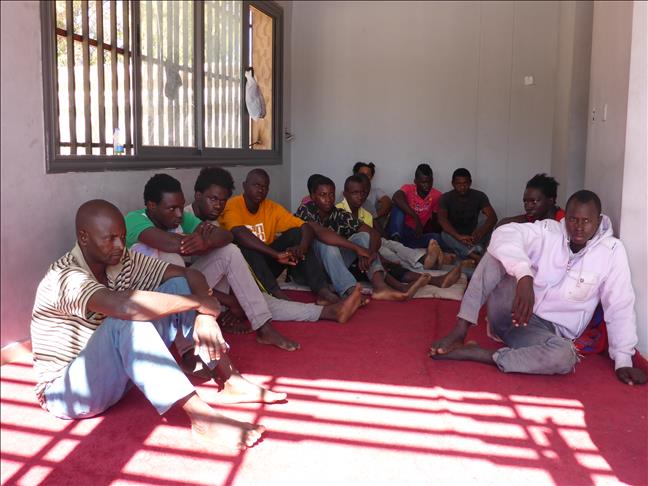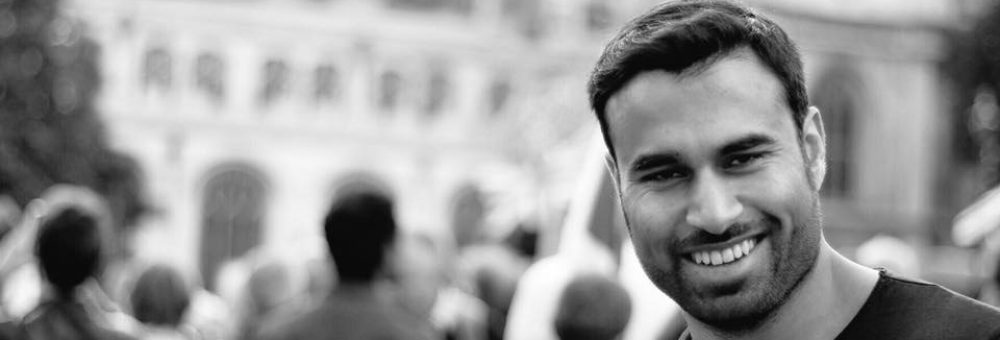 TRIPOLI
TRIPOLI
Since the fall of Gadhafi, African migrants mainly from Chad, Niger and Mali have been flocking to Libya hoping to get work or a boat to Italy. AA reporter Assed Baig goes to detention centres in Tripoli to meet some of them.
Armed men guard the entrance of the zoo in Tripoli, some are dressed in military fatigues, whilst others stand around smoking. Beyond the windy road lies a ‘detention centre’ run by a former militia that now works under the Interior Ministry. The area around the gates of the zoo still has some of its former lustre, designed to attract Libyans to its once scenic grounds.
The militia were initially charged with zookeeping, but as the problems in Libya multiplied, so have their responsibilities. They are now charged with dealing with migrants and comb the streets of Tripoli looking for migrants without valid visas or documentation.
Commander Said Gars Alaha sits on an old sofa placed in the shade, outside the door to the facility. A small table in front of him, he has a file and an empty cup sitting next to it. Inside, migrants are lined up against the wall. Uniformed men wearing medical facemasks inspect any documentation the migrants may have whilst asking them questions. Gars Alaha wears a blue uniform with military style black boots. He has a neatly kept short grey beard and welcomes us warmly. He is keen to point out that this is a processing facility and that migrants are not kept here for more than 72 hours.
“This is not a prison”, he points out to me.
None of the guards inside seem to be carrying guns. He tells me that he is upset at foreign journalists twisting the story and making it seem like migrants are being kept with animals.
“I am happy for you to look around, as long as you tell the truth,” says Alaha.
There are various pick-up trucks and police cars parked around the grounds, including a minibus with caged windows. I am told that this is for transporting migrants to another facility.
Inside, the migrants line up, most are Black Africans. Abdullah, the guard, inspects their passports. None of the men have a valid entry stamp. Some do not have passports. 27-year-old Fafuna Musa from Mali, tells me that he came to Libyato feed his family, “I just want to earn money and go home to my family”. This is a common story told here. Migrants are unlikely to admit that they will attempt to journey further toItaly. Most end up working in Libya trying to earn money to feed themselves and their families back home. Some save up to take the dangerous journey by boat to Italy. During Gadhafi’s regime numbers of African migrants from Libya were stemmed as Gaddafi asked for money from European countries to prevent a ‘Black Europe’. Since his fall the levels have increase as lack of security allows smugglers more freedom to operate.
The migrants look tired. Their clothes are ripped and some do not have any shoes. Most have travelled the desert to get to Libya, a journey that can take up to a month depending on where they are coming from. Some have travelled from as far-a-field as Nigeria.
There is dust and dirt all over their clothes. Some of these men work on construction sites. The youngest is 18 years old.
Fafuna looks over 50 but tells me he is only 27. I question him further, and he responds by saying, “Anna miskeen,” meaning “I’m poor” in Arabic. The guard says the story is always the same and replies, “ I know that all of you are ‘miskeen’.”
Some of the migrants are cut and are bleeding. The guard is quick to tell me that the wounds were caused when the migrants ran from the police. I ask the migrants to make sure that this is true; they confirm the guard’s version of events.
Badara is another detainee, he works in a restaurant and is using his mobile phone to call his boss. He says that his boss has his paperwork and passes the phone over to the guard so that he can speak to the restaurant owner. A look of desperation runs across his face as he hopes that his boss will be able to secure his release. Many businesses in Libya rely on migrant labour. It is cheap and as in countless other countries Libyan’s sometimes do not want to do the jobs that migrants are prepared to do.
I am led through the facility and I spot some blood on the floor. Again Abdullah is quick to point out to me where the blood has come from. They have come very aware of the negative publicity that this facility has received recently.
Outside in the courtyard Egyptians and Tunisians are queuing at a door to a small room. Their blood will be tested for any diseases, Abdullah tells me, specifically for HIV and Hepatitis.
We are then taken to one of the main detention rooms. The guard signals for the men to stand up and come to the front. I stop him; I don’t want orchestrated pictures for the benefit of the media. He opens the padlock to the iron barred room. I take pictures of young men as they sit on the floor of the room.
There are two mats on the floor and I count 12 detainees. My guide points out to me that they have two air-conditioned rooms, a toilet and bottled drinking water, but this room is not particularly clean. The men are ushered out and back through to the main hall leading to the entrance, where the get into a van to be taken to another detention facility to which we do not have access. The commander assures me that those that do not have valid visas, documentation or passports will be repatriated to their countries of origin.
Earlier this year Amnesty International said that refugees, asylum seekers and migrants were being held in ‘deplorable conditions’ in Libya. The human rights organisation visited seven “holding centres” in April and May this year. Amnesty international said they found “evidence of ill-treatment, in some cases amounting to torture”. The organisation also said that many foreign nationals were being held in Libya and were subjected to “arbitrary arrests and held for long periods in deplorable conditions at immigration detention facilities described by the Libyan authorities as “holding centres”, with no immediate prospect of release or redress in sight.”
We have had no problem accessing this facility, but there are others detention centres and prisons that we do not have access to. We spoke to a former prisoner of a facility in Khums to the east of Tripoli. He alleged that routine beatings and sexual assault were a common practice. One detainee told Anadolu, on condition of anonymity, that women were forced to have sex with guards in exchange for their release.
However, in this detention centre the guards and commander are keen to point out what they consider to be good treatment of the detainees. We did not see any of the guards shout or use force whilst we were there.
“They eat what we eat,” Gars tells me, referring to the sandwiches and they ate. “We have women to take care of and check the women. We do not treat people badly,” he adds.
We also visited a detention facility in Sabha, the largest city in the south of the country and usually the first city that migrants arrive in when enteringLibya. Although we were allowed on to the facility, we were not permitted to see where the detainees were being kept. According to the Deputy Commander Al-Medani Muhammed Al-Zarouq there are 600 undocumented migrants being kept at the facility. A local resident of the city who has seen the facilities told me they were very dirty and difficult to enter because of the smell. This could be why I was refused entry to see the migrant’s living conditions, 600 people enclosed in a small building, not allowed to leave, in the hot conditions of Libya, is bound to result in terrible conditions. There was no mention of air-conditioning at the Sabha facility.
I was told that the migrants are divided into nationalities and that the majority of are from Niger, Chad and Mali.
“We cannot send some migrants back to their countries, like those from Somalia and Eriteria, as they are refugees,” says Al-Zarouq.
The undocumented migrants from Niger are sent back to their country in trucks, paid for by the interior ministry he tells me. I am shown the kitchen of the facility, but am not permitted to take any pictures or speak to the migrants working there. It seems clean. There are crates full of freshly cooked packed lunches. Al-Zarouq opens one for me, pointing out that he, the guards, and the detainees all eat the same food. Each little box has macaroni and a piece of chicken in it, and I can still see the steam rising from the food. The rest of the facility seems to be undergoing some renovation. There are two armed guards standing around, the majority of whom are unarmed.
There are many detention centres and prisons spread across Libya. The number of detainees is unknown at the moment as numbers fluctuate as people are released, repatriated or transferred to other facilities. Undocumented migrants that are captured face a long detention, repatriation and in some cases physical abuse. The future of Libya’s prisons and detention centres is uncertain until the government manages to bring everything under control and conform to international standards of transparency and access.
As I leave the detention centre in Tripoli I can see some of the migrants praying their noon prayer. They sit on the prayer mats long after their Libyan counterparts have finished praying. Their hands are raised in supplication towards the sky. Their heads tipped down like wilted flowers, they pray for relief, for a way out of this detention centre, for their loved ones at home, and for a miracle.
